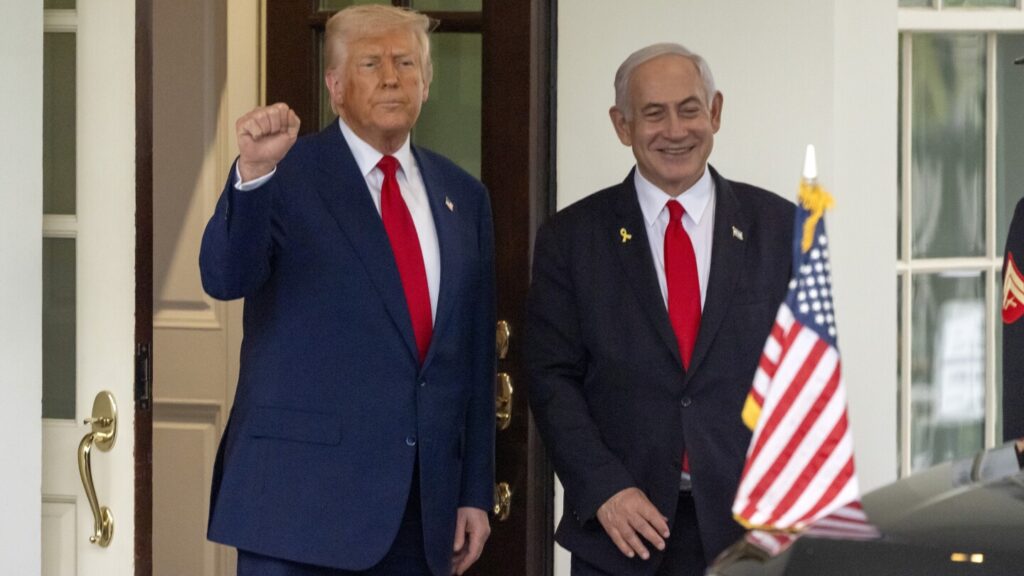
WASHINGTON (AP) — President Donald Trump is set to host Israeli Prime Minister Benjamin Netanyahu at the White House next Monday, intensifying efforts to mediate a ceasefire between Israel and Hamas. This meeting underscores the U.S. administration’s commitment to resolving the ongoing conflict in Gaza.
The impending visit, confirmed by two U.S. administration officials under the condition of anonymity, marks Netanyahu’s third trip to the White House since Trump reassumed office in January. The meeting follows the U.S.’s recent involvement in Israel’s conflict with Iran, highlighted by targeted strikes on Iranian nuclear sites. Trump has since shifted focus towards ending the hostilities between Israel and Hamas.
U.S. Push for Ceasefire
Speaking to reporters on Friday, Trump expressed optimism about achieving a ceasefire in Gaza within the coming week, though he provided no further details. White House Press Secretary Karoline Leavitt emphasized that ending the Gaza conflict remains a top priority for the administration.
“It’s heartbreaking to see the images that have come out from both Israel and Gaza throughout this war, and the president wants to see it end,” Leavitt stated. “He wants to save lives.”
Meanwhile, Israeli Minister for Strategic Affairs Ron Dermer is in Washington for discussions with senior U.S. officials on a potential Gaza ceasefire, Iran, and other pressing issues.
Challenges in Negotiations
Efforts to broker peace have faced significant hurdles, primarily due to disagreements over whether the war should conclude as part of any ceasefire agreement. Approximately 50 hostages remain captive in Gaza, with fewer than half believed to be alive.
As Netanyahu prepares for his visit, Trump continues to face scrutiny from Democratic lawmakers and others regarding the impact of U.S. and Israeli strikes on Iran’s nuclear capabilities.
According to a preliminary report by the U.S. Defense Intelligence Agency, strikes have significantly damaged the Fordo, Natanz, and Isfahan sites, though they have not been completely destroyed.
Rafael Grossi, head of the International Atomic Energy Agency, noted on CBS’ “Face the Nation” that while the sites have been damaged, some capabilities remain intact, allowing Iran the potential to resume operations if they choose.
Domestic Controversies and Arms Sales
In a controversial move, Trump has intervened in Israeli domestic politics, calling for the dismissal of charges against Netanyahu in his ongoing corruption trial. Labeling the trial a “WITCH HUNT,” Trump has vowed U.S. support for Netanyahu against these charges, a stance that has stirred unease within Israel’s political circles.
Concurrently, the Trump administration has approved a $510 million arms sale to Israel, providing more than 7,000 guidance kits for Joint Direct Attack Munitions (JDAMs). While this deal is modest compared to the over $3 billion in annual U.S. military aid to Israel, it underscores the U.S. commitment to Israel’s defense capabilities.
“The United States is committed to the security of Israel, and it is vital to U.S. national interests to assist Israel to develop and maintain a strong and ready self-defense capability,” the State Department affirmed in a statement.
Looking Forward
As the meeting between Trump and Netanyahu approaches, the international community watches closely, hoping for a breakthrough in the protracted Gaza conflict. The outcomes of these discussions could significantly influence the geopolitical landscape in the Middle East, with potential ramifications for U.S.-Iran relations and the broader regional stability.
Associated Press writer Matthew Lee in Washington contributed to this report.




